
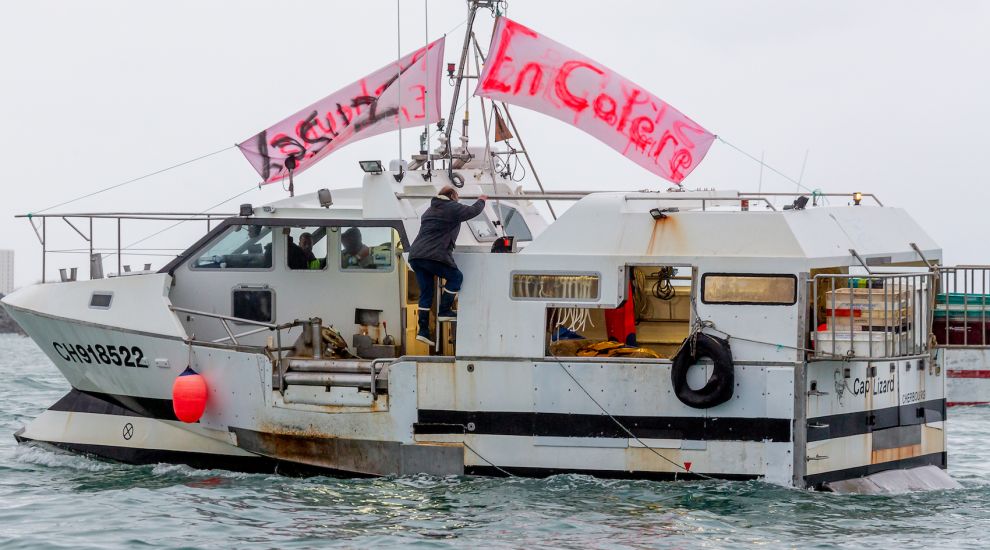

Here, Express tries untangles the complexity of the latest chapter in the island's fishing row with France.
Fishing returned to the news agenda this week, after both the UK and Jersey gave details of the amount of licences it was granting to EU fishermen.
The closest neighbour to both – France – quickly expressed its anger at the number, threatening ‘retaliatory measures’ and lobbying the EU to take action.
It is a complex picture with multiple players who all have their own interests to safeguard.
There are also wider diplomatic issues – such as defence, trade and border controls – at play, as we explore...
Jersey says it has followed the terms of the UK-EU Brexit agreement.
The key part of it (Article 502, point 1) says:
“Each Party shall grant vessels of the other Party access to fish in its waters reflecting the actual extent and nature of fishing activity that it can be demonstrated was carried out during the period beginning on 1 February 2017 and ending on 31 January 2020 by qualifying vessels of the other Party in the waters and under any treaty arrangements that existed on 31 January 2020.”
The next part adds more detail:
“'Qualifying vessel’ means, in respect of fishing activity carried out in waters adjacent to the Bailiwick of Guernsey, the Bailiwick of Jersey, the Isle of Man or a Member State, any vessel which fished in the territorial sea adjacent to that territory or that Member State on more than ten days in any of the three 12-month periods ending on 31 January, or between 1 February 2017 and 31 January 2020.”
For Jersey, the issue is black-and-white: prove that you fished for more 10 days in any of those clearly set-out periods, and you’re eligible for a licence.
However, there is another aspect: “Reflecting the actual nature and extent” – only six words but they go to the very heart of this complex dispute.
Jersey argues, and UK agrees, that they mean that the other Party has to give details of what they were fishing for (nature) and how intensely they fished for it (extent).
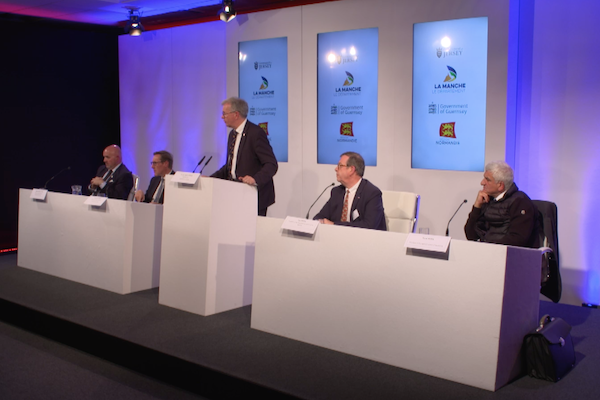
Pictured: The Chief Minister speaks at the end of last week's CI-Normandy summit.
This will allow fisheries officers to control who catches what in Jersey’s waters in order to create a sustainable fishery, as long as it is applied fairly and based on scientific evidence.
It was this interpretation of the “nature and extent” part of the agreement which particularly riled French fishermen when Jersey first issued licences at the end of April, after the initial four-month transition period ended.
They said they were given no notice of the conditions applied and that it did not reflect their fishing activity.
Jersey said it applied the conditions based on the evidence it received, which it was happy to admit wasn’t much. "We can only work with what we’ve got" was the island's basic position.
However, to take the heat off after May’s angry protest around the Harbour, Jersey agreed to delay the issuing of licences again until the end of September.
At the end of this second amnesty, Jersey has delayed the “nature and extent” part and only issued licences based on proof of fishing for at least 10 days over the last three years.
“The licence conditions specifically regarding ‘days at sea’ and ‘gear used’ will remain suspended to allow for further discussion between Jersey, the UK, the EU and France on the interpretation of ‘extent and nature',” the Government said on Wednesday.

Pictured: Jersey has decided to delay the introduction of licence conditions restricting when fishermen can fish and what they can catch.
In many ways, this is the crux of the matter, and was highlighted by Jersey Fishermen’s Association Don Thompson in his reaction to this week’s announcement.
“How can we manage our fish stocks, stop overfishing, and rebalance the relationship between our fleet [of around 70 boats] and the much larger French fleet, when the same number of boats are fishing in our waters as before?” was the essence of his argument.
He went as far to say that even more French boats had been given licences than the number that fished regularly around Jersey.
At the moment, French boats that worked around Jersey under the old Bay of Granville Agreement, and can prove it, have been given a licence. It is therefore, in theory at least, no change from the pre-Brexit ancien regime.
The Government recognises this, but it has decided to adopt a staged implementation in the interests of diplomacy. With more discussion, they argue, all sides will hopefully agree that licences can and will be restricted, if the science proves they need to be.
However, it is entirely possible that another battle will ensue when Jersey starts to restrict the terms of the licences that it has already issued, even once the number of licences is settled.
This could be the first battle of a longer conflict, if agreement among the four parties is not reached.
The French position is complex as there are regional and national interests at play. For Jersey, the key regions are Normandy and Brittany – both close neighbours but their situations are very different.
It only takes an east coast walk on a clear day to appreciate how close the Cotentin peninsula is to the island. Indeed, our 12-mile limit halves off the east coast as the line marking its territorial limit squeezes down the mid-point between France and Jersey.
For this reason, the vast majority of boats that fish in Jersey’s waters, especially the smaller day boats, are from Norman ports.
Jersey also has closer cultural and historic ties with Normandy, especially the nearby Manche department. Indeed, an annual summit between the region and the Channel Islands was held in Jersey last week.
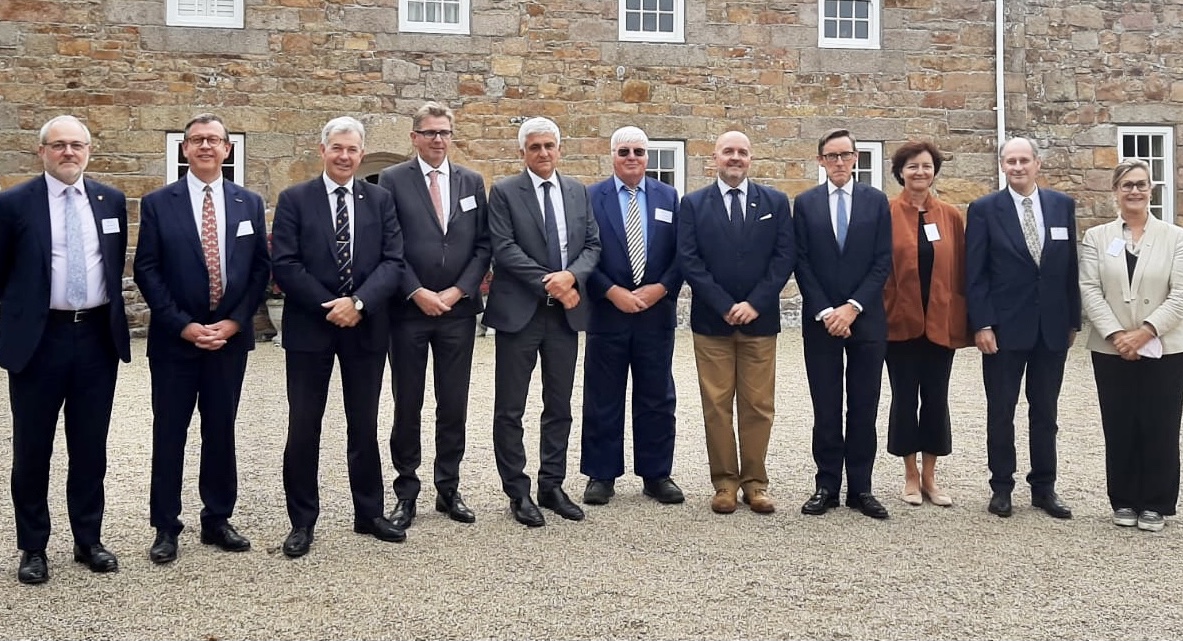
Pictured: Some smiles: French and Channel Island politicians met in Jersey for an annual summit last week.
This closer relationship has meant more dialogue and more cooperation over fishing licences than Brittany, not least because more livelihoods are at stake on the Norman side. It also seems that Normandy has been more proactive in supplying evidence on which Jersey can grant licences.
This resulted in Normandy receiving 72 of the 75 licences it applied for, with Norman boats making up around half of the 31 temporary licence-holders who have until the end of January to provide more information on past fishing activity that will – if received and accepted by Jersey – allow them to upgrade to a full licence.
With most fishermen licensed, the Norman rhetoric this week as been more conciliatory and there are currently no plans for another May-style protest.
However, it remains to be seen if Normandy joins in with any wider ‘retaliatory measures’ called for by other regions and nationally. Financial sanctions and action in Saint Malo have all been mooted in the past.
Most of the 75 licence that Jersey refused to issue were small Breton boats. This is because, Jersey says, there was not enough evidence to support France’s claim that these boats fished around Jersey for at least ten days in any of the last three years.
Because these smaller boats operating from Breton ports have so much further to travel to reach Jersey’s waters than their Norman colleagues, the reason for the lack of evidence could be simple: that they never actually fished around Jersey, despite having the right – under the old Bay of Granville Agreement – to do so.
If that is the case, these boats cannot meet the terms of the trade agreement, whatever protestations of Breton representatives. If, on the other hand, there is evidence – as Jersey's External Relations Minister told the President of Brittany, Loïg Chesnais-Girard during a meeting on Wednesday – ‘provide it and we will issue licences’.
But, publicly, Brittany is furious. Within hours of his meeting with Senator Gorst, M Chesnais-Girard tweeted he was “driven by anger” over the “unacceptable” situation.
Paris is equally angry at the situation, with the national Minister of the Sea Annick Girardin issuing a 15-day ‘ultimatum’, after which point retaliatory measures could be announced.
Other politicians have said this could include restricting the landing of shellfish caught by Jersey fishermen into French ports. Mme Girardin’s threat in May to cut off the electricity supply to the Island has also been raised again, although not by the Minister herself.
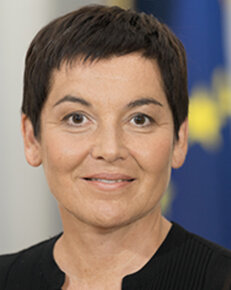
Pictured: French Minister of the Sea Annick Girardin couldn't have been clearer in her view as licensing announcements were made this week, declaring in English, "I want the licences back!"
The national government argues that it has already made concessions by reducing the number of licence applications from the 320-plus that France had under the Bay of Granville Agreement down to 47 larger boats – which have all received licences – and 169 small boats, of which Jersey has agreed to issue 64 and a possibly another 31 licences, if enough information is provided.
Paris wants all 169 small boats to receive licences. It also wants all licences it applied to the UK for to be granted. “I want the licences back,” Mme Girardin said on Wednesday.
Paris says it will lobby the EU Commission to ensure that all licence applications – made for both Jersey and UK waters – are granted. It remains to be seen what ‘retaliatory measures’ it will organise in the meantime.
There are also wider issues at play, not least the UK, the EU and France’s post-Brexit relationship, which covers such not-insignificant issues as trade, defence, international relations, migrants and energy policy.
Like Jersey, the UK says it has pored over the data submitted by the EU and issued licences based on that evidence – which for them is a track record of fishing between 2012 and 2016.
On Tuesday – coordinated to be just before Jersey’s own announcement – the UK released details of how many licences it was issuing.
London has granted licences to almost 1,700 EU vessels to fish in UK waters, between its 12 to 200 nautical mile zone. However, for boats under 12m which applied to fish in the UK’s 6-12nm zone, London said it could only issue licence 12 of the 47 applications, based on the evidence available.
Like Jersey, the UK said it would continue to work with the European Commission and France, and would consider any further evidence provided to support the remaining applications.
Although backing Jersey’s narrow position on fishing, the UK will also be clearly thinking of its wider interests, as it forges a new regional and global role after Brexit.
Among all the announcements and threats of the last few days, the Brussels-based executive arm of the EU, the Commission, has taken a more investigative approach.
The key players: Commission President Ursula von der Leyen and Fisheries Commissioner Virginijus Sinkevičius have not aired their personal views, although member state France has certainly said it will share its position with Brussels.
Most likely, the Commission will want to filter out any hyperbole and vitriol but how much it will side with Paris is as yet unknown. The UK and Jersey will undoubtedly be pointing to the relevant parts of the trade agreement, as they have since January.
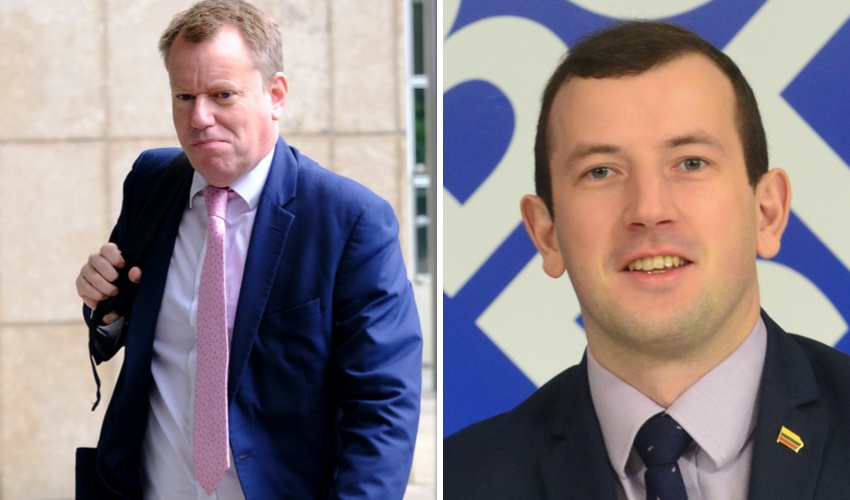
Pictured: Representing the UK's interests is Lord David Frost, while EU Fisheries Commissioner Virginijus Sinkevičius is lead negotiator for the EU.
Unlike May, Jersey licences are not the only issue, with the UK publishing its own list of permitted EU boats this week, which also upset the French, so the EU is also dealing with London as well as Jersey.
On Thursday, an EU spokesman said: “While we welcome the announcements concerning some of the fishing licences, we regret that the number of licences is so limited that it is still not possible to close this file.
“We are asking the UK to share their methodology with us, and we will continue discussions so that new licences are issued, to the benefit of our fishermen.”
The outcome of those discussions could be weeks, if not months, away.
Although bound to the terms of the trade agreement like Jersey, Guernsey is yet to announce how many licences it will issue to French boats.
It has extended its interim arrangement – allowing 168 French boats into its waters – on a monthly basis, although a review of evidence of past fishing activity is expected to be completed this month.
New licences will not come into effect until next February, according to Guernsey, giving time for fishermen to review them and provide more data if needed.
The differing approaches between Jersey and the more "accommodating" Guernsey have been highlighted in the French media, with Ouest-France commenting on Thursday, using a French phrase, that: “The Channel Island neighbours definitely do not see noon at the same time.”
Guernsey’s geographical position – being much further away from France – also means that its waters are less frequented by smaller Norman boats than Jersey’s.
These under-12m-vessels, many without tracking beacons, have been the subject of most tension.
Jersey awaits French reaction after fishing licence decision
Jersey won't 'break Brexit' to resolve fishing row
“Frank” discussions calm French fishing anger as key decision looms
FOCUS: A timely summit aiming to claw back friendship
FOCUS: French make 'power play' as fishing anger flares again
“Incorrect political commentary” puts fishing deal at risk
French PM blames fishing row on lack of "political will"
Minister considering two ‘Plan Bs' to avoid further fishing amnesty extension
Back in May, Express explored the reasons behind the fishing protests in depth, and why the island was being accused of ignoring the UK-EU Brexit deal on the Bailiwick Podcast...
Subscribe to Bailiwick Podcasts on Spotify, Apple Podcasts, Deezer or Whooshkaa.
Comments
Comments on this story express the views of the commentator only, not Bailiwick Publishing. We are unable to guarantee the accuracy of any of those comments.